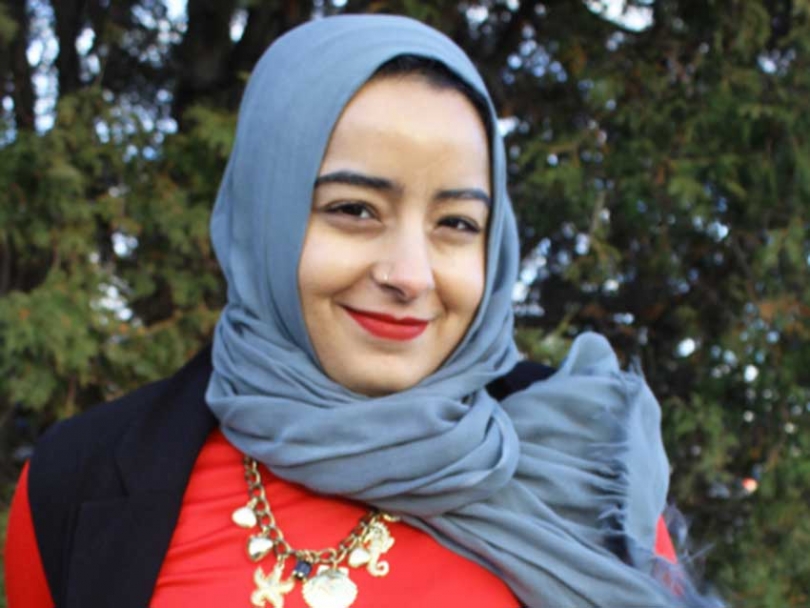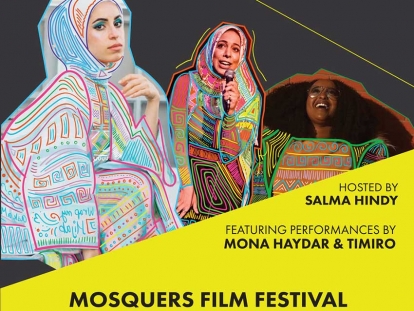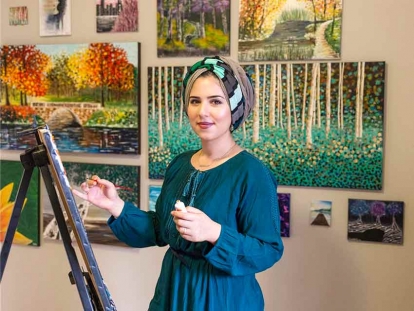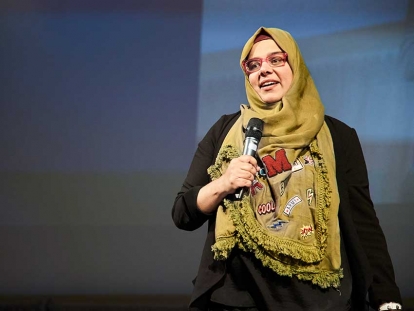 Iman Nakhala is a Montreal-based Muslim Canadian fashion designer.
Iman Nakhala is a Montreal-based Muslim Canadian fashion designer.
Mar
The fashion industry can be a cold and cut-throat world, but one happy-go-lucky Muslim woman is bringing warmth to it, one clothing collection at a time.
Iman Nakhala is a fashion designer from Montreal; arguably the main hub of arts and culture in Canada. Originally from Palestine, Iman was born in Saudi Arabia in 1986 and moved with her family to Quebec in 1993.
“My parents moved us to Canada in 1993 to get a higher education just like they did. I’m bi-cultural and proud of it,” she says.
Like many young Muslims raised in the West, Iman often found herself straddling more than one identity.
When asked about her experience growing up in Quebec, Iman had this to say,
“It was wonderful and magical yet very hard. It’s difficult to be bicultural. I never found that I belonged anywhere but I surrounded myself with good friends and that made every bump on the road worth it. It defined me and shaped me to be strong, humble, and confident.”
Iman recalls getting her first job when she was 15 years old. Working in retail, she often had to put up with difficult customers who made bigoted remarks.
“ [There were] loads of mean people with mean comments. People telling me to go back to my country or take off the towel off my head. But at the end of the day, it takes all kinds of people to make a world, but there are still good-hearted, kind people out there and that’s what keeps my hope alive.”
Having originally studied modern languages and linguistics at Concordia University, Iman describes herself as a flower child; artistic and free-spirited. Having started off her career at a desk job, she soon found that it was not enough for her and that she had a calling for more creative endeavours.
“Fashion really began for me when I was so over being in an office,” she explains. “My dad is a financial advisor and my mum was a teacher, so they had pretty stable and safe jobs and I guess they expected the same for me. It was a little difficult to convince them at first because they were afraid for me—I guess for security and safety. But I never was one to follow. I needed to be free. I loved shoes and clothes and colours so much. I knew it was the best choice for me to go into the industry.”
After leaving office life, Iman headed back to school at Montreal’s Academy of Arts and Design where she graduated with great distinction and acquired the skills needed to make it in the competitive fashion industry.
“It was the best decision I made,” Iman insists. “The fashion industry is a beautiful and cruel world.”
Iman has seen the industry from the inside and out. Having worked at mainstream companies like Dynamite and Joshua Perets gave her an insider’s perspective on how the fashion world really works.
“It’s beautiful because you get to express who you are through colours and textures and there’s no judgement there,” Iman reassures. “You are free to be exactly who you want to be. Some people might not see that but it’s absolutely beautiful when you get into it. I obviously had challenges because of my veil but that never stopped me. You just have to have faith in God and keep hustling”
Iman admits that it hasn’t been easy. Like many artistic industries, fashion can be competitive and unforgiving. Something as simple as someone’s own personal choice of attire can have a significant effect on how they are perceived.
“It was always a dream of mine to get into shoes first,” explains Iman, “I had found the perfect opportunity, but when they found out I was Muslim and veiled, that company refused me and they were so blunt about it. That in itself shattered me. It made me want to give up, but I knew that if I gave in, I would never achieve my potential.”
Indeed, Iman did not stop there. With a go-getter attitude, she was unstoppable. This was only a hiccup in a long road ahead.
“It just made me that much stronger and that much more determined to break all the boundaries. I decided to use every negative comment as fuel to keep pushing” she says.
Sure enough, Iman was resolved to keep on going. However, she faced rejection one more time when she applied to be a part of Montreal’s Fashion Week.
“I tried to get into Montreal Fashion Week and I remember preparing so much for it,” she recalls.
“When the [time for the] interview came, the judges were so harsh with me; asking me all kinds of cultural and political questions saying that my collection is too different for the city […] It’s like they never actually noticed the work but focused so much on how I used Morocco as inspiration. They weren’t impressed with that and thought that I was trying to make a statement. There were four judges that day and only one of them was kind enough to say that my style is nice but might not work in Montreal because it was too ‘out there’.”
But while one door may have closed, another opened. Iman later applied to Ottawa Fashion Week and was welcomed there with open arms.
“Ottawa is filled with an amazing mixture of races just like Montreal, but from what I experienced, I noticed that Ottawa is more forgiving, if that makes sense,” Iman reflects. “There’s a true sense of companionship and bonding through the different races. They embrace the difference instead of making it too obvious.”
Iman recalls her time spent in Ottawa as a life and career-altering experience. After having witnessed Montreal’s harsh terrain, Ottawa was a breath of fresh air.
“After the show, the response was tremendous. I was so touched that people appreciated what I brought to the table. After the show, everyone came out to congratulate me for having the guts to put out my work publicly. It was a positive experience and I met so many wonderful designers and made lifetime friends.”
She has since also participated in Vancouver Fashion Week.
Some could describe Iman’s style as being hard to place. She herself admits that her taste is quite eclectic, “I’m like a chameleon; I dress how I feel. I don’t like to be restricted. It’s the only way I can be truly creative, really. So if I feel like dressing like a complete tomboy then I’ll do so. If I want to be a princess, then I’ll do that as well.”
Just by scrolling through Iman’s blog, one can see exactly what she means. One day, she rocks a very street savvy outfit comprised of a denim blouse left open over a graphic t-shirt of Snoop Dog and a black beanie on top of her yellow hijab. The next day, Iman is wearing a jacket she made herself, with detailed embroidery crafted by Jordanian women. The day after that, she wears a flowery pink dress.
“There are not real rules in fashion and that’s why I love this world! Because rules are made to be broken,” she explains. “And it’s the same way when I design, I don’t usually follow a certain trend. I like to design for women who want to stand out from the crowd; strong women who are not afraid to make a statement and show their true colours.”
In a world of so many different colours, shapes, and genres, one could find it hard to find their own distinct style, but Iman has some advice for that.
“Comparing yourself to others is not going to work because it’s how you hold yourself that will make a difference,” she says. “If you’re super comfortable and confident with what you have, then you too will rock any outfit you wear.”
To Iman, fashion is not only about the functionality of clothing but rather what they can represent about the individuals who wear them, “It’s always good to look for inspiration in others but never to be like them," she says, "We all have something to offer. So why not show it through clothes?”
If there’s one thing about Iman, it is that she has endless enthusiasm about designing and she does not like to limit herself. Her designs reflect her passion for personality and cultural expression.
When asked to describe her work, Iman says,“I like to make pretty dresses that make women feel like princesses. I like to make pretty things; they can work for hijabis and non-hijabis. I custom-make too and am open to making modest wear for those who ask it from me.”
For any young Muslims trying to make their mark in the fashion industry, Iman has this advice, “Never be afraid to leave your mark no matter what anyone says! Always follow your heart and design how you feel. Don’t do things to please others because life’s too short anyway! Believe in yourself and what you do because then others will too and will invest in you. Practice makes perfect, take the time to perfect your craft. It’s okay to make mistakes; I’ve made lots of those. But at the end of the day, you’ll just get better and better every day. Fashion is constantly changing and constantly evolving. So get on top of everything and educate yourself!”
Ultimately, Iman hopes to see the fashion industry make a few changes. Namely, she is concerned by the concept of “fast-fashion” and the effects it has not only on the environment but on people’s self-esteem.
“Mass production has many negative social and political effects in underdeveloped countries,” she explains. “If people don’t work in the industry or have knowledge about this matter, they would never think about the details that go into making garments. Unfortunately, consumerism has got us by the tail.”
“It would also help if companies took the time to be inclusive and understanding that there are different body shapes out there […] Humans are all different and we all have different edges and curves. It is important to respect that, but I feel like companies now are so focused on fast fashion that sizing is not important. I used to wear XS at Zara 10 years ago, now I barely fit in a medium!”
In terms of inclusiveness, Iman has a lot to say. Sizing and body shape is one thing, but Iman wishes the industry would cater and be open to everyone. In a time where there is often heated and emotional discourse around culture, Iman applauds the efforts of big name fashion houses to be more open.
“If you look at Dolce and Gabbana or Yves St Laurent or even Dior, you’ll see that true fashion is about acceptance and cultural inspiration," she shares, "As for the religious/ethnic portion, I think fashion has evolved in such a tremendous way,” Iman observes. “Modesty is more and more present and it’s refreshing to see that there is room for that in the industry. Hijabis are daring when it comes to fashion and very creative. So it’s very exciting to see that it’s becoming a thing. I mean look at New York Fashion week! There’s a hijab model now! And a hijab designer, so I think they’re doing good in being open.”
As for her own future, Iman is currently working on a project involving other female designers and she also hopes that her career so far can inspire young girls.
‘I hope to still be able as creative as I am now and make things happen,” she shares, “I hope that I can still inspire women to fight of what they want and be true to themselves. I have this little project in mind and I hope it works out. It would be a little collective store with multiple women involved where we push each other to be stronger and happier business women to share our work with the world and, through that, give back to our communities. It’s for all the little Muslim girls who have dreams but have been shut down by either their families or the people around them.”
Check out Iman’s personal style blog here
Check out Iman's designs showcased at Ottawa Fashion Week here
This article was produced exclusively for Muslim Link and should not be copied without prior permission from the site. For permission, please write to info@muslimlink.ca.















